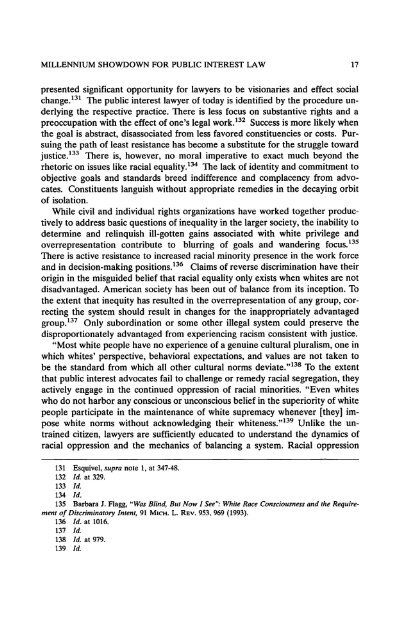Download Electronic Version - UDC Law Review
Download Electronic Version - UDC Law Review
Download Electronic Version - UDC Law Review
You also want an ePaper? Increase the reach of your titles
YUMPU automatically turns print PDFs into web optimized ePapers that Google loves.
MILLENNIUM SHOWDOWN FOR PUBLIC INTEREST LAW 17<br />
presented significant opportunity for lawyers to be visionaries and effect social<br />
change. 131 The public interest lawyer of today is identified by the procedure underlying<br />
the respective practice. There is less focus on substantive rights and a<br />
preoccupation with the effect of one's legal work. 132 Success is more likely when<br />
the goal is abstract, disassociated from less favored constituencies or costs. Pursuing<br />
the path of least resistance has become a substitute for the struggle toward<br />
justice. 133 There is, however, no moral imperative to exact much beyond the<br />
rhetoric on issues like racial equality.134 The lack of identity and commitment to<br />
objective goals and standards breed indifference and complacency from advocates.<br />
Constituents languish without appropriate remedies in the decaying orbit<br />
of isolation.<br />
While civil and individual rights organizations have worked together productively<br />
to address basic questions of inequality in the larger society, the inability to<br />
determine and relinquish ill-gotten gains associated with white privilege and<br />
overrepresentation contribute to blurring of goals and wandering fOCUS. 135<br />
There is active resistance to increased racial minority presence in the work force<br />
and in decision-making positions. 136 Claims of reverse discrimination have their<br />
origin in the misguided belief that racial equality only exists when whites are not<br />
disadvantaged. American society has been out of balance from its inception. To<br />
the extent that inequity has resulted in the overrepresentation of any group, correcting<br />
the system should result in changes for the inappropriately advantaged<br />
group.137 Only subordination or some other illegal system could preserve the<br />
disproportionately advantaged from experiencing racism consistent with justice.<br />
"Most white people have no experience of a genuine cultural pluralism, one in<br />
which whites' perspective, behavioral expectations, and values are not taken to<br />
be the standard from which all other cultural norms deviate.,,138 To the extent<br />
that public interest advocates fail to challenge or remedy racial segregation, they<br />
actively engage in the continued oppression of racial minorities. "Even whites<br />
who do not harbor any conscious or unconscious belief in the superiority of white<br />
people participate in the maintenance of white supremacy whenever [they] impose<br />
white norms without acknowledging their whiteness. ,,139 Unlike the untrained<br />
citizen, lawyers are sufficiently educated to understand the dynamics of<br />
racial oppression and the mechanics of balancing a system. Racial oppression<br />
131 Esquivel, supra note 1, at 347-48.<br />
132 Id. at 329.<br />
133 Id.<br />
134 Id.<br />
135 Barbara J. Flagg, "Was Blind, But Now I See": White Race Consciousness and the Requirement<br />
of Discriminatory Intent, 91 MICH. L. REV. 953, 969 (1993).<br />
136 Id. at 1016.<br />
137 Id.<br />
138 Id. at 979.<br />
139 Id.














